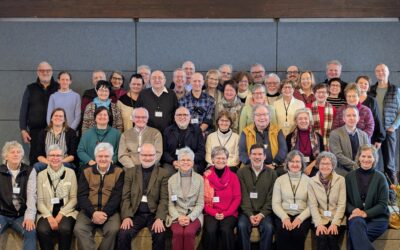 How did you react to the news?
How did you react to the news?
With surprise and joy. The word that immediately came to mind was ‘service’, in the way Jesus teaches us. Now all I have to do is serve the Church, and through it, society.
What are your first impressions?
In the first place: that I have a chance to give my contribution as an aspect of communication in dialogue. Secondly, looking at the group of consultants, which is made up of priests, a nun, a lay woman and several lay men: that here you see the Church in its various vocations, its charisms and its intercultural dimension.
What is your background and experience in the field of social communication?
My degree was in Social Communication, Social Science and Catholic Social Teaching. My first studies were in the field of education, at Montevideo, my home town. Later on I studied Formation in Popular Communication and Analysis of Social Communication at Buenos Aires. After that I got a degree in Sociology at the Gregorian University, Rome, and a Master’s in Catholic Social Teaching at the Lateran University. Last of all, again at the Gregorian, I obtained a doctorate in Social Sciences, specializing in communication. My work has been in the field of communication, not just as theory but as social practice within the constructive interplay of theory and praxis.
What is your current experience of the Latin American Episcopal Conference?
I have been part of it for 6 years as a communications consultant, and in that role I was present at the Fifth General Conference of the Latin American Episcopate held in Aparecida (Brazil). Experiences like that have touched me deeply, seeing at first hand the social relations that make up Latin American people. The Latin American Episcopal Conference, CELAM, since it began in 1955 has had a real and lasting commitment to dialogue and communion with the universal Church, which comes from its very being as Latin American. In relation to Vatican II, the General Conferences of the Episcopate at Medellín, Puebla, Santo Domingo and Aparecida give witness to this powerful desire. I believe that being a consultant to PCCS while being a member of CELAM, I will be able to be a bridge, even though there is already a high degree of communion between these two parts of the Church.
What influence does the spirituality of Chiara Lubich have on what you do?
The Spirituality of Unity is where my core vocation is rooted: to share Jesus’ dream, ‘May they all be one.’ I got know Focolare spirituality in the 70s when, like all Latin American young people, I was looking for something to change the world. In Chiara’s spirituality I found a Jesus who was alive, and with other young people I learnt how to put the Gospel into action, forming a community open to everyone, and building a little town – the Mariapolis Lia – which proclaimed to society that Jesus’ New Commandment can be put into practice and that the presence of Jesus among people united in his name is a visible reality capable of transforming society. As time went by I carried on living that same experience in the various Focolare communities where I have been. I have done this until now, when I am here in Bogotá with the wonderful Columbian people.
I begin my new service with joy because of the love for the Church that Chiara Lubich, with her own life, communicated to us.




0 Comments